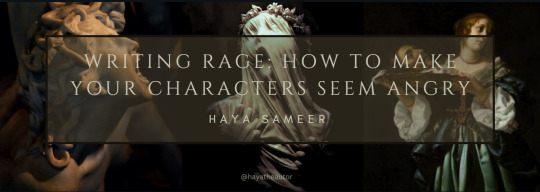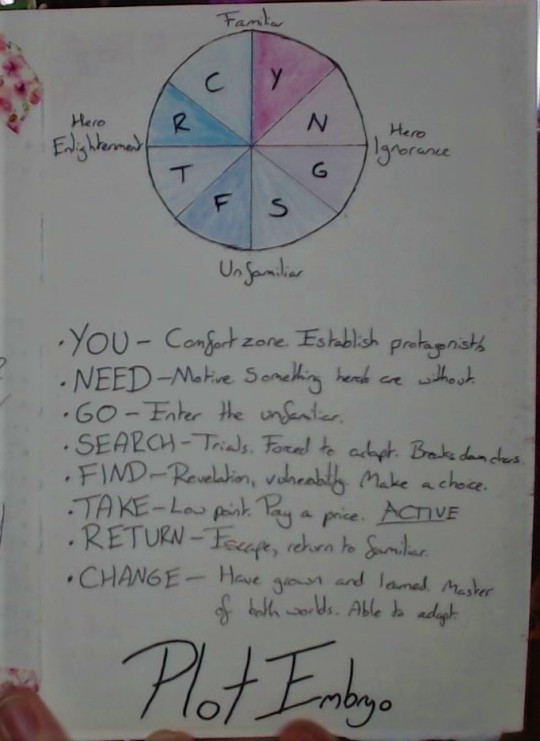#author advice
Text
Writing rule:
Every character who speaks gets their own paragraph. If two characters are talking, each time they switch you must create a new paragraph.
Do not add more than one characters’s dialogue into a single paragraph or it will be too confusing for the reader.
#writing advice#writing tips#author advice#author tips#writing#writeblr#authors#books#writblr#author#aspiring writer#fiction writing#novel writing#creative writing#authors supporting authors#author blog#writing blog#stories#writerscorner#writing help#writing rules#wattpad author#ao3#wattpad#ao3 writer#wattpad writer#writer blog
5K notes
·
View notes
Text
"How do I plot a book" You don't. You start writing. You make notes about ideas you have while writing. When you're finished, you bring everything together like a puzzle. You fix potholes, you delete dead scenes, you bring in funky dialogue. You let someone else read it and put some patches on it. Tada! There's your book.
2K notes
·
View notes
Text
Writing Rage: How To Make Your Characters Seem Angry

Anger is a powerful emotion that can add depth and intensity to your character's personality. If you're facing issues realistically expressing your characters' rage, here are some quick tips to help you get the ball rolling. Whether your character is seething with quiet rage or exploding in a fit of fury, these tips will help you convey their emotions vividly to your readers.
This is blog one in my writing different emotions series. Go check it out to explore more emotions!
Facial Expressions
Furrowed Brows: Describe the deep lines between their eyebrows, signaling frustration or intensity.
Tightened Jaw: Mention their clenched jaw, indicating suppressed anger or tension.
Narrowed Eyes: Highlight how their eyes narrow, showing suspicion, irritation, or anger.
Raised Upper Lip: Note the slight curl of the lip, suggesting disdain or contempt.
Flared Nostrils: Describe how their nostrils flare, indicating heightened emotions like anger or aggression.
Body Language and Gestures
Crossed Arms: Show their defensive stance, portraying resistance or defiance.
Pointing Finger: Describe them pointing accusatively, conveying aggression or assertion.
Fist Clenching: Mention their clenched fists, symbolizing anger or readiness for confrontation.
Hand Gestures: Detail specific hand movements like chopping motions, indicating frustration or emphasis.
Aggressive Posturing: Describe them leaning forward, invading personal space to intimidate or assert dominance.
Posture
Tense Shoulders: Highlight their raised or tense shoulders, indicating stress or readiness for conflict.
Upright Stance: Describe their rigid posture, showing control or a desire to appear strong.
Stiff Movements: Mention their jerky or abrupt movements, reflecting agitation or impatience.
Eye Contact
Intense Stares: Describe their intense or prolonged gaze, signaling confrontation or challenge.
Avoiding Eye Contact: Note how they avoid eye contact, suggesting discomfort or a desire to disengage.
Glaring: Mention how they glare at others, conveying hostility or disapproval.
Dialogue
Raised or strained tone with variations in pitch reflects heightened emotions.
Short, clipped sentences or abrupt pauses convey controlled anger.
Use of profanity or harsh language intensifies verbal expressions of anger.
Volume increase, from whispers to shouts, mirrors escalating anger levels.
Monotonous or sarcastic tone adds layers to angry dialogue.
Interruptions or talking over others signify impatience and frustration.
Aggressive verbal cues like "I can't believe..." or "How dare you..." express anger explicitly.
Reactions
Physical Reactions: Detail physical responses like increased heart rate, sweating, or trembling, showing emotional arousal.
Defensive Maneuvers: Describe how they react defensively if someone tries to touch or talk to them, such as stepping back or raising a hand to ward off contact.
Object Interaction
Aggressive Handling: Show them slamming objects, throwing things, or gripping items tightly, reflecting anger or aggression.
Use of Props: Mention how they use objects to emphasize their emotions, like slamming a door or clenching a pen.
Descriptive Words:
Verbs:
Roared with fury, expressing unbridled anger.
Snapped in frustration, indicating sudden irritation.
Shouted angrily, releasing pent-up emotions.
Glared fiercely, showing intense displeasure.
Slammed objects in rage, symbolizing anger's physical manifestation.
Grunted in annoyance, displaying impatience.
Raged vehemently, portraying uncontrolled anger.
Adjectives:
Furious and incensed, conveying intense anger.
Seething with rage, bubbling beneath the surface.
Livid and fuming, exhibiting visible anger.
Agitated and irritated, showing growing impatience.
Enraged and wrathful, expressing extreme anger.
Vexed and irate, indicating annoyance.
Infuriated and incandescent, highlighting explosive anger.
Looking For More Writing Tips And Tricks?
Are you an author looking for writing tips and tricks to better your manuscript? Or do you want to learn about how to get a literary agent, get published and properly market your book? Consider checking out the rest of Haya’s book blog where I post writing and publishing tips for authors every Monday and Thursday! And don’t forget to head over to my TikTok and Instagram profiles @hayatheauthor to learn more about my WIP and writing journey!
#hayatheauthor#haya sameer#haya's book blog#haya blogs#blog masterlist#writing community#writing tools#writer things#writing advice#writer community#writing techniques#writing prompt#writing stuff#creative writing#ya writing advice#writing tips and tricks#writer tools#writers of tumblr#writer blog#writers block#writers on tumblr#writerscommunity#writer stuff#author help#author advice#writing emotions#how to write emotions#emotional writing#writing#author
412 notes
·
View notes
Text
"Keep your head in the clouds and your hands on the keyboard."
Marissa Meyer
#writing#writers#writeblr#creative writing#on writing#writing tips#writing advice#advice for authors#author quotes#author advice#writers on tumblr#aspiring author#write#authors of tumblr#authors on tumblr#book writing#writing inspiration#creative inspiration#writing motivation#motivating quotes#get motivated
59 notes
·
View notes
Text
K.M. Weiland is one of my favorite authors on writing. She has an entire series and website devoted to "helping writers become authors."
#author advice#writing resources#writing#writers#writers on tumblr#writing community#writerscommunity#writer things#writerslife#novel writing#writing tips#writing tools#how to write#writing help#writing advice
114 notes
·
View notes
Text
Please help me I am so bad with technology (yes I'm twenty three and am so so bad with technology)
I'm trying to play around with ao3s 'new work' page to get the hang of it, but when I copy and paste Chap 1 into the box, it doesn't keep the formatting at all. I've tried googling, It didn't help ( it could also be my fault, lol).
How do I copy and paste my work I to that box while keeping all my italics and such?! It's over 30k words at this point, and I don't want to do it manually 😳
For context, I'm using a Samsung phone for this, I don't have a laptop. I do have a tablet if that is better. It's also a Samsung. And I've been writing on Google docs (mobile)
Also- follow up question for later: how do I post multiple chapters into one work?
#ao3#ao3 fic writing#fanfiction writer#fanfic#writing#lou asks writing questions#archive of our own#ao3 fanfic#writing questions#formatting#formatting questions#google docs#good omens fanfic#please help#baby author#good omens#fanfiction author#text formatting#samsung#android#ao3 help#ao3 author#help me please#author advice#please save me from all the work im going to have to do to fix this
12 notes
·
View notes
Note
could you share some tips on how you got into writing and anything you can share with us on how you got this big 👑
hi there 🫶🏻
this big? 🥹 I'm literally going to cry.
so I really got into writing when I was watching ,,Once upon a Time'' back then and I guess I got the idea from being unhappy with the plot and how the show ended
but on a more serious note, I discovered that fanfiction was a thing and then it kinda became my hobby. I write fanfiction because it gives me comfort hence why some of my topics are regarding mental health or just fluffy fics that are supposed to make the reader feel good.
the only real advice I can give is: write, write, write away. If you have a show, movie or a fandom that you are really passionate about then give it a go. In terms of the actual process of writing this is what I usually do/used to do:
I research a LOT. If I write for a fandom or a character that I don't know well, I do a lot of reading and watching. I study what the character wears, how they speak, what their little characteristics are and I make up my own headcanons beyond the show/movie in my mind or write them down.
I'm honest here. Sometimes ideas will just pop into your mind, sometimes I drive somewhere, overhear a conversation or a big one: song lyrics. I hear something and I get a certain idea and then when I have the time, I sit down and try to write.
I find it really helpful to create sentence starters or just story beginners and so there are different ways. Starting with describing the weather, the atmosphere or what a character is doing at that moment. I'm happy to share my starters and prompts with anyone if you would like.
and again don't be afraid to look for inspiration. there are some great prompt blogs out there like my favourite one: @littlewhispersofsolitude who post amazing ideas and you don't have to completely take their ideas but you can always scroll through their blogs to get some inspiration.
and lastly it's all about just typing away what comes to your mind. Your beginner things will be awful, unless you are secretly very incredibly talented and should consider switching careers. My beginners stuff on wattpad is bad and I considered deleting it but then I remembered that it's a reminder for how much my writing has improved over the years.
If anyone on here needs some more advice, would like some prompts, sentence starters or inspiration I am always happy to share, whether that is for the Sarah Paulson fandom or any other fandom or genre.
I hope this helped a little 🫶🏻
#asks#blogging#Sarah paulson#fandom#writing#fanfiction#on writing#creative writing#writerscommunity#writing community#writing tools#writer things#writing advice#writer community#writing techniques#writing prompt#writing stuff#writing tips and tricks#writer tools#writers of tumblr#writer blog#writers block#writers on tumblr#writer stuff#author help#author advice
10 notes
·
View notes
Text
Hey, y'all, I wanted to come and say something a little important. Because I've had writers come and ask me for advice, so here's my advice. Please don't be rude.
If you ever feel like your writing isn't good enough or people don't like your work, just know this. Sometimes, when it comes to fantic people, only wanna see the fantics of that one character their focusing on or stuck on, so when you start to branch out to other characters, they'll either like it or don't like it and unfollow.
But that just comes with writing period! Everyone is not going to like everything you write. Same with me. Some people like my fics while others will come on anon and talk shit and tell me to stop. But that will never phase me because I love writing it's my passion.
And I know as writers it feels good for people to tell you how much they love your writing, it makes you want to hear it again and again. But it's also alright for people to not like it, just as long as you do! You keep liking it and improving it to your liking. Writing is your voice.
Also, please don't change your blog just because people don't like your writing anymore. PLEASE DO NOT! Be discouraged so much that you remove your personality from your blog.
Keep writing for the followers you do have, and continue to post whatever content you like. Hope this helped ❤️🤎
Love y'all and always remember to be kind to yourself.
#black reader#black writers#black tumblr#self post#tumblelog#black girls#poc reader#poc writer#black representation#black excellence#writing motivation#writing advice#author advice#paisholotus#paishotalks
14 notes
·
View notes
Note
any writing advice for someone writing their first novel? (*cough, cough, aka me*)
<3

Disclaimer: what works for me might not work for you, so feel free to take, twist and scrap whatever you need. I recommend asking/shopping around for ideas and other authors' processes, and it'll take some trial and error before you find what works best for you. But here's how I personally write.
Disclaimer disclaimer: this got real long while I was writing it and I realised how terrifying it must look to a first time writer. Take it step by step, at your own pace. It's not as scary as it looks xx
BEFORE YOU WRITE
(I'm going to be focusing on the story itself, but I'm sure it goes without saying that you should have your characters planned out first)
First things first: have a basic idea of the story beats. It doesn't have to be a Big Old Detailed Outline, just a basic compass to keep you going in the right direction so you're less likely to hit a roadblock. Personally I use the Plot Embryo! Here's my favourite video explaining it:
youtube
It's a nice simplified, easy to use tool for plotting. Here's a page from one of my journals breaking it down in a way I can personally come back to and understand:

hopefully you can read my shitty handwriting but I've put a little breakdown in the image description.
I then use these prompts to scribble down the basic idea of what journey I want my main character/s to go through, and use that as my blueprint for when I write.
WHILE WRITING
First things first: if you're like me, and seeing errors or plot holes in the stuff you've already written will bug you forever, do what I do and NEVER READ BACK OVER YOUR WORK WHILE IT'S STILL IN PROGRESS. Sometimes I have to skim back to remember where I am but as a rule, once something is written it's no longer my problem until the whole thing is done.
Don't worry about chapters and other such structure. I use the plot embryo to split things up so I know where I am, but otherwise chapters and scenes Do Not Exist until the editing process. Here's the "chapters" of a WIP as an example (this is a slightly different embryo adapted for romance but you get the idea)

Then just keep going until you're done. You don't even have to do it in order. If I'm stuck on a scene, I'll just put a big word in all caps that I can ctrl+f easily (usually either ELEPHANT or PENIS sklfsgskjf) and move on to the next bit I have ideas for, then come back to it later.
This first finished story will be bad. It'll be rough, patchy, full of holes. THAT'S OKAY. This is what we sometimes call the "Zero Draft". The draft that literally exists just to get the story out of your head to make the whole thing easier.
EDITING
Warning: editing is the longest, hardest part of writing a novel. Your book will go through several different versions, be scrapped and torn apart and put back together again. This is what makes the story great.
This is where every author differs, and there's a whole bunch of ways this can go. Personally, the first thing I do once the zero/first draft is done is put it down. Don't look at it, don't touch it, don't think about it. For at least a month. This allows you to come back to it with fresh eyes that haven't been staring at the same words for so long they just hate the whole thing regardless (and you WILL HATE IT. This is normal).
Then, the first thing I do is read back over the whole thing, adding notes and reactions as if I am a reader. If a part of what I've written makes me go 🥺🥺🥺, I'll write that down. If something could be worded better, I write that down. If you think a certain thing that you would put in the tags of a tumblr post, write it down. Treat it like you're someone else's beta reader, note down every negative, every positive, every ???? part. This will give you an idea of what is and isn't working. Here's some of my funniest notes from my zero draft of book 2 just to prove how literal I'm being here:






Then, and this is a controversial move that doesn't work for everyone but it works for my autistic adhd self-loathing brain: WRITE THE WHOLE THING AGAIN. FROM SCRATCH.
This sounds daunting and it is, but you've already written it once, so the second time is easier. Usually I don't worry about making this perfect because again, this is just another draft. I'll copy from my zero draft anything that I think is fine and write new bits or scrap bits as I go.
Sometimes, the story is fine. Sometimes this is an easy refining process. However, if you're anything like me, sometimes the whole thing is messy and you'll realise halfway through rewriting that the whole thing needs restructuring. Do not despair. This is normal.
I'm using book 2 of the Truth Saga as an example for this. I got 40k words into rewriting it before I realised that the reason it felt so 'off' was because the whole thing was sagging in the middle, characters were being left behind, and the whole thing needed restructuring.
It was a rough realisation, as Reckless Truth (book 1) was such a comparatively easy process. I only did three drafts and didn't have to restructure much. Book 2 is giving me so much grief and I'm gonna slap it when it's done.
If you hit this roadblock, it might be time to do what all mood writers hate. Detailed plotting. Go right back to basics. Write down every plot point in detail this time. Act like you're spoiling the whole entire story for someone. Have you ever watched a movie or book review where the reviewer does a full breakdown of the plot? Do that. In this you'll find out exactly where you're going wrong and be able to tweak and fix it. If you have more than one main character, I recommend doing a separate plot thing for each of them and one for the book as a whole so that you can make sure their emotional arc is getting the attention it deserves.
Then, when you're happy with the new plot you've written based on the draft of your story, go back and try to rewrite it again. If this sounds like a nightmare, it is. But it's worth the work, I promise.
From there it's a case of rinse and repeat, reread, rewrite, re-edit until you're mostly happy with what you've got. Then send it to beta readers and editors to tear apart even more and put it back together until you think it's ready! I also recommend joining some writing discords, watching streams or videos about writing, just research research research basically
Happy writing!
#writing advice#author advice#writeblr#authorblr#novel planning#writing process#authors of tumblr#answered#mine#writing#sagetheenbymage
18 notes
·
View notes
Photo

(via Siblings in Fiction)
3 notes
·
View notes
Text
youtube
Ellen Brock again with another amazing video! If there's one channel you should binge-watch every video, it's Ellen's! Her experience in the industry is invaluable. This is a great video for writing a page-turning story :)
#ellen brock#plot driven#writing characters#youtube#rightwriter#writing tips#writing#author tips#author advice#writer#writer advice#writer tips#editor advice#how to write a plot-driving character#character analysis#character writing#Youtube#nanowrimo 2023#nanowrimo#preptober
6 notes
·
View notes
Text
Hello
Hey, if you're an author if you're a new author or if you're someone who wants to be common author? Or you want to write stories. I have a discord group where you can learn things and have fun and make friends Everyone is accepted there. We do have a few rules. Like no being mean to each other in a bullying at all. But that's pretty much it. Anyways this is the server By the way you can also join if you write poetry that counts
#Author#New author#lgbt#reading community#author life#Make friends#Author tips#writing help#writing tips and tricks#author advice
3 notes
·
View notes
Text
Blog Posts Masterlist
Here are all the blogs I've written sorted according to six categories and a lot of sub categories.
Post Writing (Publishing):
Querying/Getting Published
How To Get Published As A Minor—A Step-By-Step Guide
How To Get Out Of The Slush Pile And Make Your Agent Say Yes
How To Answer Some Common Literary Agent Questions
The Rejection Checklist: Manuscript Pitfalls to Avoid
Editing
Everything You Need To Know Before Editing Your Manuscript
How To Eliminate Passive Voice From Your Manuscript
Pre Writing:
WIP building
Ten Dos And Don'ts Of Worldbuilding
How To Name Your Characters
A Step-by-Step Guide to Crafting a Compelling Storyline
How to Pick The Perfect Weapon For Your Characters
Writing tools
How To Hook Your Readers With Your Chapter's Starting And Ending
How To Write And Create A Sub Plot
How To Immerse Your Readers With Indirect Characterisation
First or Third Person? How To Choose The Right POV for Your Story
Genre-Based Advice:
Fantasy
How To Build A Realistic Magic System
Things To Consider When Writing With Mythologies
Tips To Consider When Writing A Fantasy Religious Story
Horror/Thriller
How To Get Away With Murder...As An Author
How To Get Away With Murder Part Two: Writing Murder Mysteries
How To Build Tension And Make Your Readers Feel Scared
Romance
Crafting Asexual Romance: Navigating Emotional Intimacy in Fiction
Character-Based Advice:
How To Write An Antagonist
How To Create Realistic Book Characters
How To Write A Compelling Character Arc
How To Create A Morally Grey Character
How To Write A Plot Device Character
How To Develop A Memorable Antagonist
Writing Believable Teenage Characters: Dos and Don'ts
Crafting Character Voices And Distinct Dialogue
Crafting Authentic Child Characters: From Toddlers to Tweens
How To Create And Execute Unreliable Narrators
How To Write Immortal Characters in Fiction
Creatures/Monsters
How To Write Mythical Creatures Without Sounding Redundant
How To Write Vampires With An Original Twist
'Sensitive' character topics:
How To Write POC Characters Without Seeming Racist
How To Write A Disabled Character: Ten Dos And Don'ts
How To Write And Research Mental Illnesses
Resources And Advice For Writing Abusive Parents
Scene-Based Advice:
How To Build Tension And Make Your Readers Feel Scared
Four Tips On How To Make Your Plot Twist Work
How To Set The Scene Without Info Dumping
Writing A Creepy Setting: Tips And Examples
The Dos and Don'ts of Writing Flashbacks in Fiction
Crafting Realistic Car Accidents in Fiction: A Writer's Guide
Writing Rage: How To Make Your Characters Seem Angry
Crafting Sad Scenes: Writing Tears and Emotional Depth
Fights, poison, pain
How To Accurately Describe Pain In Writing
How To Create A Well-Written Fight Scene
The Ultimate Guide To Writing Persuasive Arguments
Forgining Epic Battles: Techniques For Writing Gripping War Scenes
The Writer's Guide to Authentic Wounds and Fatalities
Ink And Venom: A Writer’s Guide To Poisonous Prose
Everything You Need To Know About Writing Stab Wounds
Everything You Need to Know About Writing Burns
Everything You Need To Know About Writing Gunshot Wounds
Everything You Need To Know About Writing Bruises
Recommendations:
Websites And Writing Apps Every Author Needs in 2023
Seven Blogs You Need To Read As An Author
Ten Websites Every Author Should Know In 2024
Series
Writing Wounds
Writing Mythical Creatures With A Unique Twist
Writing Emotions
#writing community#creative writing#writing blog#writing#writing tools#writing advice#writing help#writing tips#writing resources#writer things#author tumblr#author tips#author advice#author community#author update#haya's book blog#haya: navi#hayatheauthor#haya sameer#book blog
1K notes
·
View notes
Text
Never worry about how many times you need to rewrite before your writing is good. While it's best to avoid getting carried away with perfecting your work, it's just a reality that it takes lots of rewriting to get good. Not necessarily perfect, but good.
As Ernest Hemingway famously said, "I rewrote the ending of 'Farewell to Arms' 39 times before I was satisfied."
#writing#writers#writeblr#writers on tumblr#creative writing#writing advice#writing tips#on writing#advice for authors#exposition#am writing#am editing#revision#writing tips and tricks#writing tip#author advice#author quote#author quotes#rewrite#first draft#rough draft#writers life#writing life#writer life
21 notes
·
View notes
Text
#writing#writers#writers on tumblr#writing community#writerscommunity#writer things#writing tips#writers and readers#novel writing#writerslife#writing advice#how to write#writing tools#writing help#writing resources#author advice
9 notes
·
View notes
Text
Lazy writing tip:
If you're having a hard time writing concise and compelling descriptions, use half of a paragraph to describe something, and the other to share how our pov character feels about the thing you're describing.
"The room was warm in lighting and atmosphere, packed wall to wall with cushy furniture draped in afghans and blankets. It reminded Jess of lonely grandparents. Dated wall paper, tacky knickknacks coated in dust, a hearth covered in doilies casting a golden glow across the scene. Despite the decorator's greatest effort to make the space inviting, Jess was in the corner with her arms and ankles crossed, ignoring the chairs and couches and opting instead to stand, eyeing the room in discomfort. It was too much. Far too much. She picked at her lips and squinted at her watch in the dim lighting. She tried not to think of her bright and tidy room back home, devoid of mounted singing fish and cluttered end tables. Hopefully this meeting would be quick, otherwise Jess feared she'd break out in hives if she spent more time in the cramped and stuffy living room."
I used to really struggle writing descriptive scenes that didn't feel boring and rambly. I had a creative writing teacher my junior year of high school that gave us that advice, and it totally changed how I write! It's not easy to do, and takes lots of practice. I still struggle sometimes. Referring back to that piece of advice always leads me true though. If ever I find that I can't describe how a scene feels for my character, that's usually a good indicator for me to reconsider if I even need description there at all. Sometimes the answer is yes and I just need to rework things, other times i cut the scene and it all works out okay!
20 notes
·
View notes